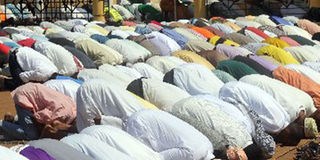Ramadhan is the month of fasting, not a food festival

Muslims gathered for Friday prayers on second week of Ramadhan at Umm Kulthum mosque on June 17, 2016. Ramadhan and the main purpose of the fast is to help a person to get nearness to God through engaging in various acts of worship. PHOTO | LABAN WALLOGA | NATION MEDIA GROUP
What you need to know:
- Ramadhan comes with economic benefits as there is reduced spending on food due to the absence of morning and lunch meals.
- For women, much of their time during this month of intense spiritual devotion is spent in the kitchen preparing the lavish meals and they are left with little or no time to engage in the recommended acts of worship.
For Sh1,600 a Nairobi hotel is offering a special five-course Ramadhan iftar (breaking the fast) dinner, where fasting Muslims are treated to a wide variety of sumptuous foods and drinks.
From hotels to homes, lavish food parties at the time of breaking the fast have become a common trend among Muslims — an aspect that has helped to fuel misconceptions among non-Muslims that fasting is synonymous with feasting.
A walk down the street in a Muslim-populated area and one would be dazzled by the wide array of snacks, food and drinks on display at the time of breaking the fast at sunset nears.
It is not much different in the homes as tables are filled to the maximum with different kinds of food and various types of drinks, many of which consist of oily foods which are detrimental to health.
Even more distressing is that much of this food will not all be consumed and ends up in dustbins, contrary to the Koranic principles which warn against wastefulness.
“Eat and drink, but be not excessive. Indeed, He does not like those who commit excess.” [Al-A`râf (7): 31]
Ramadhan comes with economic benefits as there is reduced spending on food due to the absence of morning and lunch meals.
With focus shifting to purchasing a wide range of food items to be consumed at iftar, these economic benefits are not realised because the spending of many increases astronomically at the onset of Ramadhan.
In some families, the amount spent on food during this period is far higher than in the other months of the year combined.
For women, much of their time during this month of intense spiritual devotion is spent in the kitchen preparing the lavish meals and they are left with little or no time to engage in the recommended acts of worship.
While fasting during Ramadhan can help one to reduce weight and improve one’s health, failure to break the fast in the proper manner can cause more harm than good.
Overeating is now a common phenomenon during Ramadhan and the results of this are the consequences of eating too much food — indigestion, stomach upsets, heartburn, bloating, belching, nausea and low energy levels. The long-term consequences are obesity and diabetes.
Eating in moderation is among the highly recommended acts of a Muslim. In one of his traditions, Prophet Mohammed (peace be upon him) said:
“The son of Adam fills no vessel worse than his stomach. Sufficient for the child of Adam are a few morsels to keep his back straight. If he must eat more, then a third should be for his food, a third for his drink, and a third left for air.” [Recorded by Tirmidhî and Ahmad].
Contrary to the prevailing notions, feasting has nothing to do with Ramadhan and the main purpose of the fast is to help a person to get nearness to God through engaging in various acts of worship which better an individual and the society at large.
The author is the editor of the ‘Friday Bulletin’, a weekly publication of the Jamia Mosque Committee, Nairobi. [email protected]




